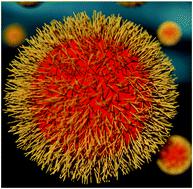Our official English website, www.x-mol.net, welcomes your feedback! (Note: you will need to create a separate account there.)
Effective SARS-CoV-2 antiviral activity of hyperbranched polylysine nanopolymers
Nanoscale ( IF 6.7 ) Pub Date : 2021-09-23 , DOI: 10.1039/d1nr03745e Luigi Stagi 1 , Davide De Forni 2 , Luca Malfatti 1 , Francesca Caboi 3 , Andrea Salis 4 , Barbara Poddesu 2 , Giulia Cugia 2 , Franco Lori 2 , Grazia Galleri 5 , Plinio Innocenzi 1
Nanoscale ( IF 6.7 ) Pub Date : 2021-09-23 , DOI: 10.1039/d1nr03745e Luigi Stagi 1 , Davide De Forni 2 , Luca Malfatti 1 , Francesca Caboi 3 , Andrea Salis 4 , Barbara Poddesu 2 , Giulia Cugia 2 , Franco Lori 2 , Grazia Galleri 5 , Plinio Innocenzi 1
Affiliation

|
The coronavirus pandemic (COVID-19) had spread rapidly since December 2019, when it was first identified in Wuhan, China. As of April 2021, more than 130 million cases have been confirmed, with more than 3 million deaths, making it one of the deadliest pandemics in history. Different approaches must be put in place to confront a new pandemic: community-based behaviours (i.e., isolation and social distancing), antiviral treatments, and vaccines. Although behaviour-based actions have produced significant benefits and several efficacious vaccines are now available, there is still an urgent need for treatment options. Remdesivir represents the first antiviral drug approved by the Food and Drug Administration for COVID-19 but has several limitations in terms of safety and treatment benefits. There is still a strong request for other effective, safe, and broad-spectrum antiviral systems in light of future emergent coronaviruses. Here, we describe a polymeric nanomaterial derived from L-lysine, with an antiviral activity against SARS-CoV-2 associated with a good safety profile in vitro. Nanoparticles of hyperbranched polylysine, synthesized by L-lysine's thermal polymerization catalyzed by boric acid, effectively inhibit the SARS-CoV-2 replication. The virucidal activity is associated with the charge and dimension of the nanomaterial, favouring the electrostatic interaction with the viral surface being only slightly larger than the virions’ dimensions. Low-cost production and easiness of synthesis strongly support the further development of such innovative nanomaterials as a tool for potential treatments of COVID-19 and, in general, as broad-spectrum antivirals.
更新日期:2021-09-23



























 京公网安备 11010802027423号
京公网安备 11010802027423号